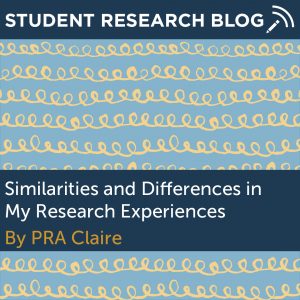By Claire Fresher, OUR Peer Research Ambassador
Many kinds of research occur on campus. Each research lab is different and unique. As a mechanical engineering student I have had the privilege of working in two labs that have shown me two different sides of what research can look like while also showing me overlap between the two.
Similarities:
In both labs, and probably at any lab you’ll be a part of, communication is very important. In my labs, there are weekly group meetings where all the researchers come together to share what they have been working on and to ask questions if they are stuck or need guidance. These meetings are very beneficial to see where others are at or learn about the amazing things other researchers are working on. This is a time to ask for help, which can be very important especially when starting out in research and doing tasks and using materials that you may have never seen before. There are also graduate students in both labs that are always willing and able to sit down with you and walk through the hard steps of the process since they have probably already done it before. They are a great resource to use while doing research and in the future, if you plan to go to graduate school.
Differences:
In Dr. Tarakanova’s lab, I specifically work with modeling the ways that amino acids aggregate in the body, which can lead to diseases like Alzheimer’s. Every week I am tasked with looking deeper into this topic and even extending my research beyond the initial goal. When I first started in this lab, my focus was on learning the software and how everything worked. Then I was able to start modeling the aggregates. Now I am in the analysis phase of each aggregate itself, examining how they compare to one another. In this lab, I am also fortunate to work alongside another undergraduate. I have found this to be very helpful since we both started in the lab together and now have been able to grow and become researchers ourselves. This lab has given me many skills including learning new software programs, literature review, and analysis.
For my research with Dr. Hancock in the Psychological Sciences Department, I have worked on two projects so far. My first project was researching how environmental and genetic factors play a role in the development of cognitive skills including language, math, and reading comprehension. For this project, I prepared to administer neuropsychological assessments to families of three to test how their brains work when given neuropsychological tasks. This study was very interesting since I was able to see two different sides of the research; actually working with the families in the verbal tasks and watching the MRI portion where I saw in real time how an MRI could be used to map the brain.
This year I am working on another interesting project where I get to create my own study of memory tasks. I now work in a group with three other undergraduates on developing this study. We are currently in the process of putting together different tasks but I am excited to use it on participants soon.
In general, in any lab you will join you’ll have different experiences but they will all teach you to be a better thinker and you will learn new skills that will help you in school and in life. Research means something different to everyone but any lab you choose to join you’ll always be challenged to be the best you can be.
Claire is a junior majoring in Mechanical Engineering and minoring in Mathematics. Click here to learn more about Claire.